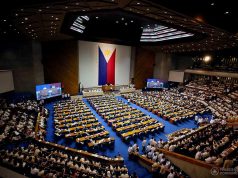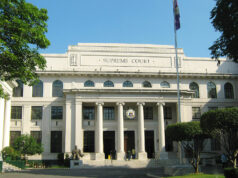Senators voice concern over Boracay shutdown
By Camille A. Aguinaldo
SENATORS on Friday expressed their dismay over the recommendation of the Department of Environment and Natural Resources (DENR), Department of Interior and Local Government (DILG) and Department of Tourism (DoT) for a one-year total closure of Boracay Island for rehabilitation.
“A one-year total closure may not be the best solution for the island and its locals,” said Senator Maria Lourdes Nancy S. Binay in a statement, noting that the three government agencies seemed unaware of the potential job losses their decision would lead to.
“A phase-by-phase rehabilitation where government can strictly enforce the law and at the same time implement the needed corrective measures could be the better option for Boracay,” she added.
Ms. Binay, who chairs the Senate committee on tourism, also noted that the government did not mention any plans for stakeholders who could be displaced because of the recommendation by the three agencies.
For his part, Senator Sherwin T. Gatchalian, chair of the Senate committee on economic affairs, offered alternative measures to solve the environmental problems in the country’s top tourist destination.
He said the government could consider shutting down erring business establishments only and filing administrative cases against negligent local officials.
Local businesses could also be mandated to improve their waste disposal systems. He also proposed a 90-day phase on the improvement of the drainage system and solid waste management.
“A complete shutdown of the island will displace 30,000 direct and indirect workers who are considered low-skilled workers. Poverty and hunger will also worsen if unemployment will rise,” Mr. Gatchalian said.
For his part, Senator Emmanuel Joel J. Villanueva, chair of the Senate committee on labor, employment and human resources development, warned that the full shutdown of Boracay may cripple the tourism industry.
“It could also have a devastating economic impact for the businesses that are compliant and for the formal and informal workers who rely on the island for their livelihood,” he said.
He urged the national government to simply ensure the compliance of business establishments with environmental laws, such as the Clean Air Act, Clean Water Act and Solid Waste Management Act.
Senator Joseph Victor G. Ejercito, however, said the inter-agency task force’s recommendation may be “worth considering.”
“Boracay has been abused and exploited through the years. Boracay has to be allowed to breathe, to recuperate and to be allowed for its wounds to heal,”
DENR Secretary Roy A. Cimatu has said the total closure of the island from tourism would give them “ample time” to implement measures restoring and sustaining the tourist destination.
In an online interview, presidential spokesperson Harry L. Roque assured that the President would be fair on deciding the island’s fate.
“I think, from the way I know the President, he will be fair and above all else, I think he will not act on the basis of political considerations. He will act based on his concerns that the beauty of Boracay must be preserved for the future generation,” he said in a mix of English and Filipino.
Meanwhile, the management of D’Mall of Boracay belied allegations that its establishment was built on wetlands, noting that its location was a “composite of lands that were classified as Commercial, Agricultural, Residential and Cocal.”
It also clarified that the mangrove and swamp area identified as wetlands is located in a lake across the Boracay road from D’Mall.
“It’s imperative that our establishments in Boracay conduct business in a manner that’s environmentally sustainable and socially responsible,” said D’Mall head of legal and regulatory compliance group Rudolph Jularbal, adding that the establishment has secured its environmental compliance certificates (EECs) from the DENR.



